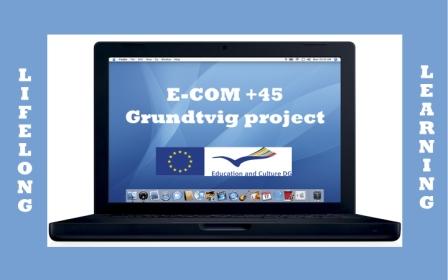
E-COM +45 Grundtvig project
 |
 |
 |
 The structure of the European society is constantly subject to demographic changes. Ought to a higher life expectancy and a decreasing birth rate, the average age of the European population is increasing steadily, something that also provokes the aging of the workforce and the probably consequently necessity of a higher investment in National Health Systems to face the increase of illnesses in the population. In spite of the development of the EU as an advanced knowledge society with greater social cohesion, it is not rare to find older people that can be doomed to isolation provoked by their physical or mental deterioration. The structure of the European society is constantly subject to demographic changes. Ought to a higher life expectancy and a decreasing birth rate, the average age of the European population is increasing steadily, something that also provokes the aging of the workforce and the probably consequently necessity of a higher investment in National Health Systems to face the increase of illnesses in the population. In spite of the development of the EU as an advanced knowledge society with greater social cohesion, it is not rare to find older people that can be doomed to isolation provoked by their physical or mental deterioration.ICT learning can facilitate to this group of population the possibility of “active ageing” not only (1) by improving their social nets (social groups, blogs, chats, etc) and by learning how to improve their everyday tasks (shopping, arranging medical appointment, general information search, etc.), but also (2) by improving their competences related to ICT in order to enable them to know and develop a new form of work organisation, such us E-work, very useful specially for promoting the empowerment of the weakest segments of the society. Examples of these are elderly people that are willing to share their experience as a civic service and mature unskilled or unemployed workers that are willing to defer their retirement by implementing E-work.
Much information related to the E-work is easily accessible on the Internet, but many of these segments can be excluded from recent ICT developments if they are not properly guided and supported in how to get used to make the most of what the net may offer. Moreover, as Information and Communication Technology is of increasing relevance within Europe, in the framework of the Lifelong Learning Programme (LLP) by the EU, the use of ICT is promoted as a factor for the enhancement of continuous training and education.
The objective of promoting longer working lives can be achieved by increasing flexibility in retirement, deferring or implementing gradual retirement, and/or combining retirement and work (remunerated or solidarity work). This can be performed facing the digital divide of elderly people through the focusing on models of ‘lifelong learning’, that may help mature workers to adapt to the knowledge economy.
Adult learning responds to different aims: personal, civil, social, and employment-related purposes, thus contributing to both productivity growth and social inclusion (see the European Commission’s Memorandum on Lifelong Learning). Mature, unskilled workers can also face discrimination by accessing to adult learning: people aged 55-64 years old are much less involved in formal and informal learning activities, including computer-based activities to overcome the digital divide.
|







